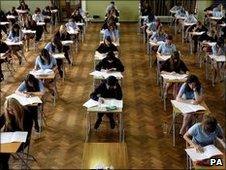'A quarter of schools' boycotted Sats tests
- Published

The tests are compulsory in England
A quarter of England's primary schools took part in the teachers' union boycott of Sats tests earlier this year.
Nearly three-quarters of schools administered the compulsory tests, the Department for Education said.
Education Secretary Michael Gove said there were "flaws" in the testing system and that it would be reviewed, but they would go ahead next year.
Many teachers say the tests are too crude a measure of pupil performance.
In particular, they object to how the test results are used in league tables.
About 600,000 10 and 11-year-olds were due to take the national schools tests in English and maths in May.
But members of the National Association of Head Teachers and the National Union of Teachers voted to boycott the tests.
Boycott patchy
The tests, introduced in the mid-1990s, were brought in to enable comparisons of primary schools and pupils.
These unions say the tests are bad for children's education - because teachers spend so much time preparing for the tests that it squeezes out other lessons.
They are also deeply opposed to the league tables drawn up from the results of the tests.
But teachers' unions were divided over the protest - with the NASUWT teachers' union rejecting the boycott.
Both the Labour party, which was in office at the time of the tests, and the Conservative party, criticised the boycott.
Among schools who took part in the boycott, some schools completely refused to carry out the tests and carried out other activities instead.
Others used previous years' papers so that they could monitor their own pupils' progress without the information being used for national league tables.
- Published10 May 2010